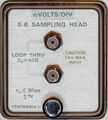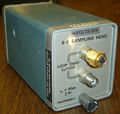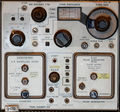S-6: Difference between revisions
No edit summary |
No edit summary |
||
| (11 intermediate revisions by one other user not shown) | |||
| Line 1: | Line 1: | ||
{{Plugin Sidebar | | {{Plugin Sidebar 2| | ||
title=Tektronix S-6 | | title=Tektronix S-6 | | ||
summary=Sampling Head | | summary=Sampling Head | | ||
image=Tek s6 | image=Tek-s6-front.jpg | | ||
caption=S-6 head | | caption=S-6 head | | ||
series= | series={{3S+7S}} | | ||
introduced=1971 | | |||
discontinued=1990 | | |||
manuals= | manuals= | ||
* [http://w140.com/tek_nov1988_s6.pdf Tektronix S-6 Manual (high quality, 1988, PDF)] | * [http://w140.com/tek_nov1988_s6.pdf Tektronix S-6 Manual (high quality, 1988, PDF)] | ||
| Line 11: | Line 12: | ||
* [http://w140.com/TEK_S6_1983.pdf Tektronix S-6 Manual (high quality, 1983, PDF)] | * [http://w140.com/TEK_S6_1983.pdf Tektronix S-6 Manual (high quality, 1983, PDF)] | ||
}} | }} | ||
The S-6 | The '''Tektronix S-6 Sampling Head''' plug-in is a 50 Ω feed-through unit with a rise-time of 30 ps and bandwidth of 11.5 GHz. | ||
It was [[introduced in 1971]]. | |||
The S-6 provides two unterminated 50 Ω SMA connections in a loop-through configuration as is convenient for [[TDR]] applications. | |||
It is good practice to leave a termination resistor on the unit when unused to give some protection against electrostatic discharge. | |||
{{BeginSpecs}} | |||
{{Spec | Rise time | 30 ps }} | |||
{{Spec | Bandwidth | 11.5 GHz }} | |||
{{Spec | Input impedance | 50 Ω (unterminated!) }} | |||
{{Spec | Noise | < 5 mV of noise }} | |||
{{Spec | Features | | |||
* No internal trigger pick-off signal | * No internal trigger pick-off signal | ||
* No internal termination | * No internal termination }} | ||
{{EndSpecs}} | |||
==Links== | ==Links== | ||
* [http://jeroen.web.cern.ch/jeroen/S6/S6.shtml S-6 internal photo and simulation] | * [http://jeroen.web.cern.ch/jeroen/S6/S6.shtml S-6 internal photo and simulation] | ||
* [https://www.circuitsathome.com/measurements/repairing-tektronix-s-6-sampling-head Repairing an S-6 head] (with internal photos) | |||
* [http://www.amplifier.cd/Test_Equipment/Tektronix/Tektronix_7000_series_special/7S12.htm S-6 @ amplifier.cd 7S12 page] | |||
* [http://www.barrytech.com/tektronix/tek7000/teks6.html S-6 @ barrytech.com] | |||
==Pictures== | ==Pictures== | ||
<gallery> | <gallery> | ||
Tek-s6-front.jpg | S-6 front | |||
Tek s6 2.jpg |S-6, entire plugin | |||
7s12-s6-s52-f.jpg | S-6 sampling head and [[S-52|S-52 pulse generator head]] in a [[7S12|7S12 TDR/Sampler plugin]] | |||
</gallery> | |||
===Measurements=== | |||
<gallery> | |||
Impuls_S6.jpg|Impulse taken with S6 sampling head. Every dot is equivalent to one sample taken, and combined on the CRT with a rate of app. 100 Hz. Bright dots are newer than dimmed ones. | |||
7s12-s52-incident.jpg | Incident pulse from an S-52 (nom. < 25 ps) displayed by an S-6 head (nom. < 30 ps), both installed in a [[7S12]]. Displayed rise time ~35 ps confirms spec. | |||
7s12-self-portrait.jpg | "Self Portrait" of an S-6: A pulse reflected on the unterminated "through" path (approx. 120 ps one way) | |||
</gallery> | </gallery> | ||
[[Category:7000 and 3S series sampling heads]] | [[Category:7000 and 3S series sampling heads]] | ||
Revision as of 17:53, 3 February 2018
Template:Plugin Sidebar 2 The Tektronix S-6 Sampling Head plug-in is a 50 Ω feed-through unit with a rise-time of 30 ps and bandwidth of 11.5 GHz. It was introduced in 1971. The S-6 provides two unterminated 50 Ω SMA connections in a loop-through configuration as is convenient for TDR applications.
It is good practice to leave a termination resistor on the unit when unused to give some protection against electrostatic discharge.
Key Specifications
| Rise time | 30 ps |
|---|---|
| Bandwidth | 11.5 GHz |
| Input impedance | 50 Ω (unterminated!) |
| Noise | < 5 mV of noise |
| Features |
|
Links
- S-6 internal photo and simulation
- Repairing an S-6 head (with internal photos)
- S-6 @ amplifier.cd 7S12 page
- S-6 @ barrytech.com
Pictures
-
S-6 front
-
S-6, entire plugin
-
S-6 sampling head and S-52 pulse generator head in a 7S12 TDR/Sampler plugin
Measurements
-
Impulse taken with S6 sampling head. Every dot is equivalent to one sample taken, and combined on the CRT with a rate of app. 100 Hz. Bright dots are newer than dimmed ones.
-
Incident pulse from an S-52 (nom. < 25 ps) displayed by an S-6 head (nom. < 30 ps), both installed in a 7S12. Displayed rise time ~35 ps confirms spec.
-
"Self Portrait" of an S-6: A pulse reflected on the unterminated "through" path (approx. 120 ps one way)





